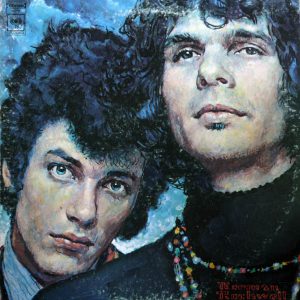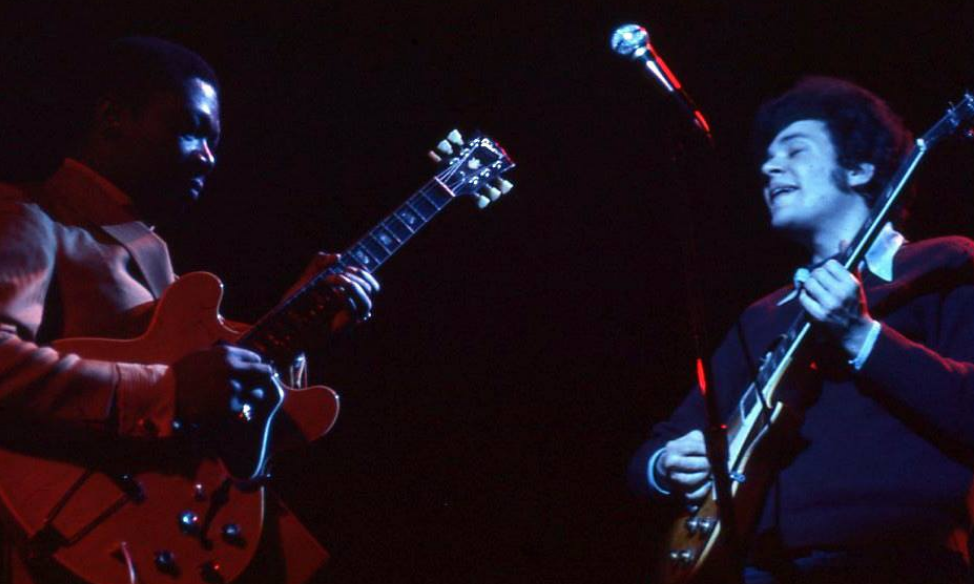IN THE 1960s musicians broke through the invisible barrier of the three-minute pop song. The single that did it, which rose to number 2, in fact, was Bob Dylan’s “Like a Rolling Stone” (1965). Its six minutes and thirteen seconds was unprecedented for a pop tune, and I vividly recall Top 40 stations playing a three-minute abridgment, which faded out incongruously mid-song. Mike Bloomfield (July 28, 1943 – February 15, 1981) was largely the mind behind that music. The next year, he cowrote — and dominated — “East-West,” the thirteen-minute raga-influenced track on the Paul Butterfield Blues Band album of the same name. Bloomfield introduced the oratorio form to pop music. Simultaneously he invented “acid rock.”
Bloomfield and Dylan were both Midwestern Jews forging cinematic fantasies from African-American music. Dylan sings in “From a Buick 6” —
“You know, I need a steam shovel, mama,
to keep away the dead;
I need a dumptruck, baby, to unload my head.”
— as Bloomfield’s guitar manically crisscrosses behind him. It’s almost a parody of a blues song. (Were Dylan and Bloomfield influenced by the Purim spiel?)
 Michael Bloomfield was also one of three rock musicians (the third was Ringo Starr) to be immortalized by Norman Rockwell, whose portrait is even more compelling now than it was in 1969, on the cover of The Live Adventures of Mike Bloomfield and Al Kooper. In the painting, Mike and Al resemble hip New Left lawyers. (Kooper wears love beads.) Rockwell emphasized their Jewish features — perhaps unconsciously? The bluish tone of the image vaguely suggests that they’re underwater, an unexpectedly apt metaphor for the late 60s.
Michael Bloomfield was also one of three rock musicians (the third was Ringo Starr) to be immortalized by Norman Rockwell, whose portrait is even more compelling now than it was in 1969, on the cover of The Live Adventures of Mike Bloomfield and Al Kooper. In the painting, Mike and Al resemble hip New Left lawyers. (Kooper wears love beads.) Rockwell emphasized their Jewish features — perhaps unconsciously? The bluish tone of the image vaguely suggests that they’re underwater, an unexpectedly apt metaphor for the late 60s.
Michael Bloomfield had an unusual history. His grandfather, Samuel, got rich in the 1930s when he saw an elegant pie case in a diner, bought the patent, and began manufacturing these cases in bulk. (This was in Chicago.) During World War II, Bloomfield Industries produced the stainless steel trays that came with K rations. After the war, the business expanded until it manufactured over 1,000 items. When Samuel Bloomfield died in 1954, Michael’s father Harold took over the business, along with Michael’s uncle.
FOR MUSICIANS of Michael’s generation, the most important instrument was the radio. Michael received one for his bar mitsve — an ivory-colored portable with a telescoping antenna. (This was in the wealthy suburb of Glencoe.) Suddenly the astonishing music that we now call “early rock ‘n roll” entered his ears. Around the same time, Michael brought a guitar home from his Uncle Max’s pawnshop. “I started playing the guitar when I was 13 years old, and I was very bad for two or three years, and when I was about 15 and a half, I got great,” Bloomfield later recalled. His housekeeper brought him to see Josh White at a club called the Gate of Horn in 1957. (A generation of affluent white kids, including many Jews, were similarly initiated into African-American music by their maids and nannies.) Two years later, Bloomfield was playing in South Side nightclubs himself.
At the time, blues artists like Howlin’ Wolf, Muddy Waters, Sonny Boy Williamson, Little Walter, and Albert King were unknown outside black ghettos. Bloomfield began seeing as much electric blues as he could. Big Joe Williams, a powerhouse Delta singer with a nine-string guitar, was a mentor to the young suburban prodigy. (Bloomfield wrote a memoir, Me and Big Joe, with S. Summerville,in 1980.)
Technically, Bloomfield wasn’t a “guitar god” like Eric Clapton and Jimmy Page. Though he was one of the first white American electric guitar virtuosos, Bloomfield never quite became a rock star. For one thing, he hated pop music. He turned down Dylan’s offer to tour with him in 1965. In a later interview, Bloomfield forgot the title of Dylan’s Highway 61 Revisited. He called it, “Something like Highway 51.”
Nonetheless, Bloomfield did session work for many musical stars. Did you know that he plays on the Brewer and Shipley version of “Witchi-tai-to”? Or on Janis Joplin’s I Got Dem Ol’ Kosmic Blues Again Mama!? Or on records by Judy Collins, Peter Paul and Mary, and the Woody Herman Orchestra? (The high-powered discography by William J. Levay contains many such surprises.)
AFTER TEAMING UP on Highway 61 Revisited, Kooper and Bloomfield each attempted to transform rock into jazz. Bloomfield was first, with The Electric Flag, a seven-piece band, including trumpet and saxophone, with a young Buddy Miles on drums. The band debuted at the Monterey Pop Festival of 1967 to enthusiastic fans and record company executives. Kooper followed suit with Blood Sweat & Tears, a band that later fired him so that they could produce insipid hit singles like “Spinning Wheel.” The Electric Flag, meanwhile imploded in less than two years, amid personality clashes and serious heroin problems. In June, 1968, Bloomfield quit the band, partly due to chronic insomnia. His own heroin use began at this point.
A story from August, 1967, when the band Cream — making its West Coast debut — opened for The Electric Flag at the Fillmore, reveals much about our hero. Introducing Eric Clapton, Bloomfield told the crowd: “This is the greatest guitarist you’ll ever hear” — proving that he possessed far too much humility to be a rock star.
The next chapter of Bloomfield’s life brings him back with Al Kooper for the Super Session album. Kooper sold Bloomfield on the project and booked a two-day session at Columbia Studios in Los Angeles. They recorded several songs, then Bloomfield snuck out, taking a plane back to San Francisco. (He left a note complaining of insomnia.) Kooper replaced him with Steven Stills the second day. Super Session reached number 12 on the Billboard charts and gave birth to the concept of the “supergroup.” One such band (which still exists!) would include the second guitarist: Crosby, Stills & Nash.
Capitalism never stands still, and the music business is even worse. The “guitar hero” of one decade is the crooning balladeer of the next, ripping off Bob Marley’s “I Shot the Sheriff” — in the case of Eric Clapton — or disappearing into Marin County, only occasionally playing an acoustic show. (That was Bloomfield.) By 1973, Crawdaddy magazine ran an article: “Whatever Happened to Mike Bloomfield?”
There was one last flirtation with rock stardom: a “supergroup” with the unfortunate name KGB, in 1976. The initials stood for Ray Kennedy, songwriter for the Beach Boys, Ric Grech, bass player for Blind Faith — anothersupergroup — and our protagonist. The sound was California “blue-eyed soul,” in the style of Boz Skaggs. By this point, Bloomfield was walking in circles, talking to himself; his car had a pile of garbage a foot high. Yet he played clever, elastic solos behind Kennedy’s grandiloquent vocals. The eponymous first album was showing promise when Bloomfield sabotaged the project with an interview in the LA Times, calling it a corporate money-making scam. Today, only scholars of 1970s rock remember KGB.
INCREASINGLY, BLOOMFIELD retreated to his house in Mill Valley, California. He continued recording, produced by his friend Norman Dayron; the records appeared on obscure labels like Takoma, Kicking Mule, and Clouds. During this period, Bloomfield recorded “I’m Glad I’m Jewish.” Despite the title, it’s not really a “joke song” but a masterful acoustic blues, finger-picked like Blind Lemon Jefferson:
I’m glad I’m Jewish;
I’m glad I’m Jewish;
Hebrew to the bone.
You know, the Christian girls
Just can’t leave them Jewboys alone.
Bloomfield had a complicated and unsatisfying love life. At one point his ex-wife Susan was living with him, with her son, while dating one of Michael’s friends. Once Susan left, our hero came apart. Towards the end, he began drinking heavily. He was found dead in his Mercury Marquis on February 15, 1981. A pathologist pronounced the cause of death cocaine and methamphetamine poisoning.
Part of Bloomfield’s problem was his musical education. He received instruction equivalent to a first-class conservatory in Germany, but due to the evils of racism, almost no one recognized the high musicianship of Chicago blues artists. In a sense, Bloomfield’s apprenticeship was a liability in the world of pop music, where musical standards are low and athletic intensity paramount.
Ed Ward’s Michael Bloomfield: The Rise and Fall of an American Guitar Hero was really a quickie biography from 1983 that’s been recently updated. The text weirdly provides the street address of every Chicago site — perhaps because the publisher is Chicago Review Press? The numerous photographs include a chilling juxtaposition of Harold Bloomfield and Big Joe Williams: biological father and spiritual father. (Mr. Bloomfield proudly preens; Big Joe Williams meditates on his guitar.)
YouTube (along with Spotify, Pandora, etc.) has transformed the rock biography. Your computer is a bountiful source of footnotes. I found a “Ready Steady Go” performance of the Paul Butterfield Blues Band — only 1.37 minutes –but certainly supporting Ward’s assessment that “Bloomfield rips off a fluid solo that ranks with the best playing ever did.” The Electric Flag debut, at the Monterey Pop Festival of 1967, may be studied in detail. Bloomfield introduced the songs nervously, with gaseous hippie jargon, but his guitar raged like a fearless Alabama preacher.
The Rise and Fall reads like a Freudian case history. Was Bloomfield’s entire problem “fear of success”? Or was he an intuitive artist who understood that the rock establishment would sap his creative energies? It’s surprising that Bloomfield was attracted to the music world equivalents of his hard-nosed father, Bill Graham and Albert Grossman, Jewish businessmen who ruthlessly pursued the bottom line. Bloomfield’s divided self was clearly the product of his two parents –a warm, artistic mother, and an exacting, mercenary father.
As an armchair psychologist, I would guess that Bloomfield was bipolar. Large doses of recreational drugs can push such a person into near-psychosis. On a sociological level, his life was a rejection of the suburbs, in favor of the (vanishing) urban culture. Ironically, Bloomfield lived much of his adult life in the “hippie suburbs” of San Francisco.
What were Bloomfield’s politics? It’s awfully hard to tell — except for being obviously anti-racist. I’m guessing they were “Mill Valley progressive.” He didn’t pay taxes from 1968 to 1972; is that a hint? (Or just laziness?) That’s the problem with studying hippies: are they “making a statement against materialism,” or are they just stoned? (Or both?)
Sparrow plays ocarina in the non-Euclidean pop band Foamola. He wrote for us recently on Bazooka Joe Comics and their fortunes and shared “Poetry for Donald Trump.” Follow him on Twitter (@Sparrow14).


























